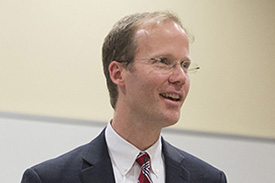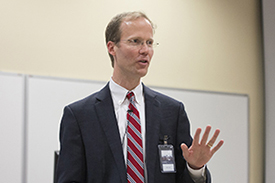Friday, February 23, 2018
Combat Trauma and Moral Injury: A Christian Psychiatrist’s Perspective
Fri, 23 Feb 2018Asa Keimig | LUCOM Marketing

Liberty University College of Osteopathic Medicine (LUCOM) Center for Research continued the Biomedical Frontiers Seminar Series (BFSS) earlier this month with featured guest speaker Warren Kinghorn, MD, ThD, associate research professor of Psychiatry and Pastoral and Moral Theology at Duke University Medical Center and Duke Divinity School.
“It is a real treat to have Dr. Kinghorn speak as he is interested in a number of things from a scholarly perspective,” said Joseph W. Brewer, PhD associate dean for Research. “His interests vary from how religious communities engage in the care of patients who have mental health challenges, Christian engagement practices of modern health care and then an interest in combat related post-traumatic stress disorder and looking at it from a Christian perspective.”
Dr. Kinghorn spoke to attendees about approaching combat related post-traumatic stress disorder (PTSD) from a Christian perspective. “I want to talk about the history of PTSD, how it relates to veterans and combat trauma, this new concept of moral injury and how we should think about that as Christians,” said Dr. Kinghorn. “The diagnosis of PTSD that most of us take for granted is rooted in the idea that we would call moral injury.”
Tony Marco, a Vietnam veteran, was 34-years old when he shot himself in the head. Marco, suffered from PTSD and struggled with guilt and despair for over 12 years. His early history revealed issues with fights in high school but his psychiatric difficulties became worse when he returned home to the United States (US) from Vietnam when he was 21-years old. He had revealed that he suffered from repetitive nightmares of sleeping in Vietnam, someone sneaking up on him, and cutting his throat.
In Vietnam, Marco experienced fights between fellow marines in addition to witnessing fellow comrades commit suicide. He was part of listening post (LP) duties several nights a week, where he and another marine would spend nights in the jungle near enemy transportation routes, listening to sounds of the enemy. Instead of taking turns sleeping, the soldiers took amphetamines to stay awake after hearing stories of the enemy slitting the throats of sleeping soldiers.
For Marco, this dream kept reoccurring over and over. His dreams became so bad that He became weary of others and eventually secluded himself. He eventually revealed that he was on patrol one night and saw someone he thought was an enemy and he slit his throat. He thought the enemy was a north Vietnamese, but it later turned out that it was actually a south Vietnamese, a friendly. He hid the body and never told anyone for fear of being court martialed.
“The kind of thing that Tony Marco experienced is something that we would now call moral injury,” said Dr. Kinghorn. “Which is when people struggle and suffer after trauma but the trauma isn’t something that has been received or afflicted upon them, but instead something in general that the individual has done or witnesses that creates a same kind of painful memory responses that other types of trauma can inflict.”
 Dr. Kinghorn believes that moral injury may help psychiatrists to better understand PTSD. “Moral injury is burdensome knowledge embodied that concerns one’s self, culture and society,” he said. He described how soldiers make decisions and then live with the consequences of their decisions indicating that killing in war is often associated with adverse mental health outcomes. “What this means is that when we send people to war and when they do what are sending them to do, kill, there are real psychological costs associated with that and we have to be mindful and aware of that.”
Dr. Kinghorn believes that moral injury may help psychiatrists to better understand PTSD. “Moral injury is burdensome knowledge embodied that concerns one’s self, culture and society,” he said. He described how soldiers make decisions and then live with the consequences of their decisions indicating that killing in war is often associated with adverse mental health outcomes. “What this means is that when we send people to war and when they do what are sending them to do, kill, there are real psychological costs associated with that and we have to be mindful and aware of that.”
He challenged listeners to think of moral injury as transgression of some sort involving an individual’s moral emotions or behaviors. “What if trauma wasn’t from what a veteran has seen, but done,” Dr. Kinghorn asked. “What is actually injured in moral injury? Think of moral injury as moral response and how it reflects a broken mind and body in a broken world.”
Dr. Kinghorn provided ten recommendations for clinicians working with return combat veterans.
Ten Recommendations
- Listen openly (avoid pigeonholes and pedestals)
- Think beyond fear and anxiety
- Utilize (with caution) evidence-based psychotherapies for PTSD)
- Don’t ignore political and social concerns
- Read and preach the hard parts of scripture
- Think broadly about confession and reconciliation
- Attend to family systems
- Invite veterans into community (with each other, in the church)
- Encourage agency and grassroots ownership
- Call veterans into service, vocation, and leadership
The next Biomedical Frontiers Seminar Series is scheduled for Thursday, March 8, at noon, in the blue auditorium (1014) of the Center for Medical and Health Sciences. The event will feature Pei Zhang, PhD, associate professor of Biology, at Liberty University.